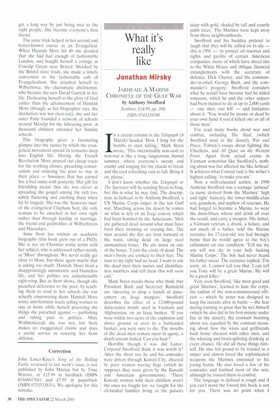Not great but definitely good
Jane Ridley
HANNAH MORE: THE FIRST VICTORIAN by Anne Stott OUP, £25, pp. 384, ISBN 0199245320 Who was Hannah More? William Cobbett called her an old bishop in petticoats, and she was the subject of a hefty, pious Victorian biography, since when she has been pretty much forgotten. The Edwardian wit Augustine Birrell buried 19 volumes of her collected works in his garden for compost. She owes her disinterment to the fashion for writing the lives of women, the more obscure the better. Is she interesting enough to merit a book of nearly 400 pages? Almost certainly, the answer is yes.
She was born near Bristol, the daughter of an impoverished charity school master, in 1745. Her older sisters ran a successful school for young ladies. Hannah, who was reassuringly plump, wrote poetry. Aged 28, she published a best-selling poem, and went to London. Here she became friendly with Garrick, who helped her write plays, she got to know Johnson and made friends with Horace Walpole. Literary London ladies bitched about her gauche tactlessness and her provincial manners, but Hannah More discovered that you could get a long way by just being nice to the right people. She became everyone's best friend.
The same trick helped in her second and better-known career as an Evangelical. When Hannah More hit 40 she decided that she had had enough of fashionable London, and bought herself a cottage at Cowslip Green near Bristol. Shocked by the Bristol slave trade, she made a timely conversion to the fashionable cult of Evangelicalism. She attached herself to Wilberforce, the charismatic abolitionist, who became the new David Garrick in her life. Dedicating herself to the glory of God rather than the advancement of Hannah More (though, as her biographer says, the distinction was not clear-cut), she and her sister Patty founded a network of schools around Mendip for the labouring poor. A thousand children attended her Sunday schools.
This biography gives a fascinating glimpse into the tactics by which the evangelical movement spread its tentacles deep into English life. During the French Revolution More poured out cheap tracts for the working classes, preaching conservatism and ordering the poor to stay in their place — bossiness that has earned her a had name with posterity. Her gift for friendship meant that she was clever at spreading the gospel among the rich too, subtly flattering and catching them when hit by tragedy. She was the 'honorary man' of the evangelical Clapham Sect, the only woman to be attached in her own right rather than through kinship or marriage, the friend and godmother of Wilberforces and Macaulays.
Anne Stott has written an academic biography (this book grew out of a PhD). She is not on Christian name terms with her subject, who is addressed rather sternly as 'More' throughout. We never really get close to More, but there again maybe that is asking too much. Hannah More lived a disappointingly unromantic and blameless life, and her politics are unfashionably right-wing. But as Stott shows, though she preached deference to the poor, by teaching them to read in her schools she was actually empowering them. Hannah More wrote anti-feminist tracts telling women to stay at home while herself practising the things she preached against — publishing and taking part in politics. Mary Wollstonecraft she was not, hut Stott makes no exaggerated claims and does a useful service in rescuing her from





































































 Previous page
Previous page